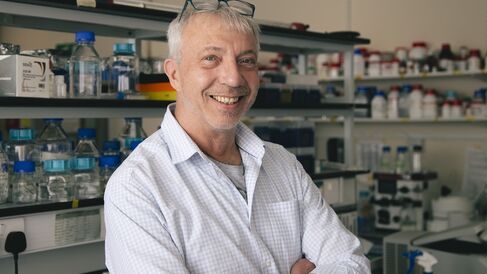Martin Welch

Control of bacterial virulence and biofilm formation in the opportunistic human pathogen, Pseudomonas aeruginosa.
Pseudomonas aeruginosa is an opportunistic human pathogen, commonly-associated with certain chronic respiratory infections. Indeed, it has the dubious accolade of recently being designated a 'critical priority pathogen' by the WHO, and is a major target for the development of new antibacterial interventions. The reason why P. aeruginosa is such a dreaded protagonist is that it secretes a welter of exceptionally active exoproducts, leading to rapid tissue degradation and, if untreated, death. It is also intrinsically-resistant to many of the most commonly-used antibiotics in the clinical arsenal, an issue which is increasingly restricting possible treatment options. P. aeruginosa also exhibits an exquisite predilection to form biofilms, especially in airway tissue, and has become a model organism for study in that regard.
The main aim of our work is to understand how virulence, biofilm formation and antibiotic resistance are regulated, with a particular emphasis on the role(s) played by metabolic and nutritional cues, environmental stress, and inter-cellular signaling systems such as quorum sensing. Remarkably for such an aggressive organism, P. aeruginosa can also cause soft tissue infections that last for decades, especially in the respiratory tract of individuals who are pre-disposed towards such infections (e.g. people with cystic fibrosis or chronic obstructive pulmonary disease). Recent advances in culture-independent analyses have revealed that in these circumstances, P. aeruginosa often shares the airways with a veritable polymicrobial zoo of 'microbial dark matter' (anaerobes and unculturables), raising the question of how these co-habitants affect the physiology and virulence of P. aeruginosa. In the last year or so, we have developed the tools necessary to address this (previously experimentally intractable) question, opening the door to a wealth of new biology. The approaches routinely employed by the team include molecular genetics, 'omics (genome, transcriptome, proteome, metabolome and fluxome), protein chemistry and enzymology, and biophysics/structural biology.
Research objectives
How does metabolism impact on P. aeruginosa virulence?
How does environmental stress affect virulence and biofilm formation by P. aeruginosa?
We have recently established that the P. aeruginosa quorum sensing signals bind to a number of previously unexpected targets in the cell. What is the impact of this, and are there more targets yet to be discovered?
How does the presence of other bacterial species influence P. aeruginosa physiology and virulence?
Key publications
Dolan SK, Wijaya A, Kohlstedt M, Glaser L, Brear P, Silva-Rocha R, Wittmann C, Welch M (2022). Systems-wide dissection of organic acid assimilation in Pseudomonas aeruginosa reveals a novel path to underground metabolism. mBio. doi: 10.1128/mbio.02541-22
TJ O’Brien, W Figueroa, M Welch (2022). Decreased efficacy of antimicrobial agents in a polymicrobial environment. The ISME Journal, 1-11. doi: 10.1038/s41396-022-01218-7
Dolan SK, Kohlstedt M, Trigg S, Vallejo Ramirez P, Kaminski CF, Wittmann C, Welch M (2020). Contextual flexibility in Pseudomonas aeruginosa central carbon metabolism during growth in single carbon sources. MBio. doi: 10.1128/mBio.02684-19
Maunders EA, Triniman RC, Western J, Rahman T, Welch M (2020). Global reprogramming of virulence and antibiotic resistance in Pseudomonas aeruginosa by a single nucleotide polymorphism in elongation factor, fusA1. J. Biol. Chem., 295:16411-16426. doi: 10.1074/jbc.RA119.012102
Abdelhamid Y, Brear P, Greenhalgh J, Chee X, Rahman T, Welch M (2019). Evolutionary plasticity in the allosteric regulator-binding site of pyruvate kinase isoform PykA from Pseudomonas aeruginosa. J. Biol. Chem., 294: 15505-15516. doi: 10.1074/jbc.RA119.009156
Crousilles A, Dolan SK, Brear P, Chirgadze DY, Welch M (2018). Gluconeogenic precursor availability regulates flux through the glyoxylate shunt in Pseudomonas aeruginosa. J. Biol. Chem., 293: 14260-14269. doi: 10.1074/jbc.RA118.004514
McVey AC, Medarametla P, Chee X, Bartlett S, Poso A, Spring DR, Rahman T, Welch M (2017). Structural and functional characterization of malate synthase G from opportunistic pathogen Pseudomonas aeruginosa. Biochemistry,56: 5539-5549. doi: 10.1021/acs.biochem.7b00852
